Europe · Regions · Spain · Western Europe
Eco-friendly hotels to consider after the lockdown
We are seeing an increasing number of empty streets around the world as a result of people having to remain indoors during lockdowns brought into place to slow the spread of COVID-19. As a direct result, there’s a variety of wildlife venturing into towns and cities as the environment recovers just slightly during that period.
From clear water and fish now evident in the once murky canals of Venice, to wild boar venturing down from the hills around Barcelona. And from goats wandering the streets of Llandudno in Wales, to peacocks strutting through the streets of Ronda in Spain.
Perhaps once we are able to turn our thoughts to holidays again, the appeal of staying in a ‘green’ hotel may be even more attractive to tourists. Having witnessed the rapid impact on the environment during our confinement, why not continue our efforts to protect our surroundings.
We have selected one luxury hotel from five different destinations in the Spanish Canary Islands. We’ve set out the main features they are recognised for in relation to their green / eco-friendly credentials, together with an overview of the general facilities on offer to guests. The Canary Islands are known as being a year-round destination so will be ready to accept tourists again after lockdowns are released.
Tenerife: Jardines de Nivaria Hotel in Costa Adeje
You can fly direct to Tenerife from many major airports in the UK with a flight time of approximately 4.5 hours.
This luxury hotel has direct access to the beachfront promenade (via a lift), and is surrounded by exotic gardens. With 271 rooms over 5 floors, this is one of the larger hotels featured here. You will find 3 outdoor pools including 1 for children. There’s an extensive sunbathing terrace with sunbeds and parasols. To escape the sun, visit the hotel’s gym with cardio fitness equipment, weights, sauna and steam room. There’s also mini-golf, table tennis and tennis available for guests to enjoy.
 You can stay at the Jardines de Nivaria on bed and breakfast, half board and full board and you can enjoy a selection of restaurants including a la carte, Spanish, buffet, and international cuisine.
During the evening, the hotel provides evening entertainment throughout the year.
Amongst the green features offered at this hotel are:
You can stay at the Jardines de Nivaria on bed and breakfast, half board and full board and you can enjoy a selection of restaurants including a la carte, Spanish, buffet, and international cuisine.
During the evening, the hotel provides evening entertainment throughout the year.
Amongst the green features offered at this hotel are:
 The hotel offers stays on a bed and breakfast, half board, or all inclusive basis. Enjoy the a la carte Italian restaurant for dinner or a buffet breakfast, lunch and dinner in the Mosaico Restaurant.
Amongst the green features offered at this hotel are:
The hotel offers stays on a bed and breakfast, half board, or all inclusive basis. Enjoy the a la carte Italian restaurant for dinner or a buffet breakfast, lunch and dinner in the Mosaico Restaurant.
Amongst the green features offered at this hotel are:
 Guests can stay at the hotel on bed and breakfast, half board and full board. Breakfast and dinner can be taken by the sea in the main restaurant. Breakfast can also be taken at the Gara Restaurant with views of the gardens surrounding the hotel, and the sea.
Sporting guests will enjoy the 5 tennis courts, beach volleyball court, squash court, table tennis, fitness centre, mini-golf and a championship 18-hole clifftop golf course.
Amongst the green features offered at this hotel are:
Guests can stay at the hotel on bed and breakfast, half board and full board. Breakfast and dinner can be taken by the sea in the main restaurant. Breakfast can also be taken at the Gara Restaurant with views of the gardens surrounding the hotel, and the sea.
Sporting guests will enjoy the 5 tennis courts, beach volleyball court, squash court, table tennis, fitness centre, mini-golf and a championship 18-hole clifftop golf course.
Amongst the green features offered at this hotel are:
 There is 1 main restaurant serving both buffet and a la carte menus where you can take breakfast and evening meal. You can either stay on bed and breakfast or half board at this hotel. During the evening, the hotel provides entertainment which is more regular during the winter season than the summer season.
Amongst the green features offered at this hotel are:
There is 1 main restaurant serving both buffet and a la carte menus where you can take breakfast and evening meal. You can either stay on bed and breakfast or half board at this hotel. During the evening, the hotel provides entertainment which is more regular during the winter season than the summer season.
Amongst the green features offered at this hotel are:
 You can enjoy the air-conditioned gym with cardio fitness equipment, an aerobics studio, strength equipment and a whirlpool. Fitness classes are also available including Zumba, pilates, spinning, yoga and aqua aerobics.
Guests can stay at the hotel on bed and breakfast and half board. There are a good number of restaurants to choose from serving from a la carte to buffet menus. You can enjoy Spanish and Japanese cuisine as well as international menus. There’s evening entertainment year round including live music for guests.
Amongst the green features offered at this hotel are:
You can enjoy the air-conditioned gym with cardio fitness equipment, an aerobics studio, strength equipment and a whirlpool. Fitness classes are also available including Zumba, pilates, spinning, yoga and aqua aerobics.
Guests can stay at the hotel on bed and breakfast and half board. There are a good number of restaurants to choose from serving from a la carte to buffet menus. You can enjoy Spanish and Japanese cuisine as well as international menus. There’s evening entertainment year round including live music for guests.
Amongst the green features offered at this hotel are:
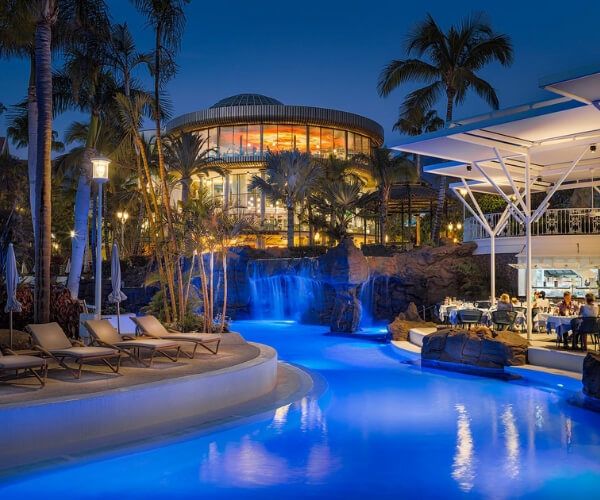 You can stay at the Jardines de Nivaria on bed and breakfast, half board and full board and you can enjoy a selection of restaurants including a la carte, Spanish, buffet, and international cuisine.
During the evening, the hotel provides evening entertainment throughout the year.
Amongst the green features offered at this hotel are:
You can stay at the Jardines de Nivaria on bed and breakfast, half board and full board and you can enjoy a selection of restaurants including a la carte, Spanish, buffet, and international cuisine.
During the evening, the hotel provides evening entertainment throughout the year.
Amongst the green features offered at this hotel are:
- Tracking of energy use and carbon emissions of the building
- Linen re-use programme including housekeeper training and regular checks
- Recycling bins in common areas
- Recycling of at least two types of waste such as paper, glass, plastic and cardboard
- Education for guests and staff training on green practices
- At least 75% of interior lightbulbs are energy-efficient
- Air conditioning and heating temperatures set to save energy
- Energy saving lighting controls in public areas
- South facing overhangs and tree shading to keep building cool
- Sensors in over 90% of guest rooms turning off lights/electronics and controlling temperature when room is empty
- Water efficient guest bathrooms and public restrooms
- At least 90% of toiletries biodegradable and with organic ingredients, refillable toiletries dispensers, recycled packaging
- Over 50% of beverages are certified – eg organic, fair trade, etc.
- Up to 75% of furniture has ‘green’ characteristics
- Complete waste assessment of building with food waste composted, safe disposal of hazardous materials such as batteries and paint
- At least 90% of mattresses, furniture and flooring is recycled when replaced
- At least 75% of landscaping is plants native to region combined with low chemical gardening
- Paving designed to minimise flooding
- Over 75% of roof painted white to reflect heat and reduce energy needed for air conditioning
- Low VOC paints, primers, adhesives and sealants used
- EMAS: Eco-Management and Audit Scheme. This enables hotels to assess, manage and continuously improve their environmental performance
- ISO 14001: Sets out the criteria and framework for an environmental management system
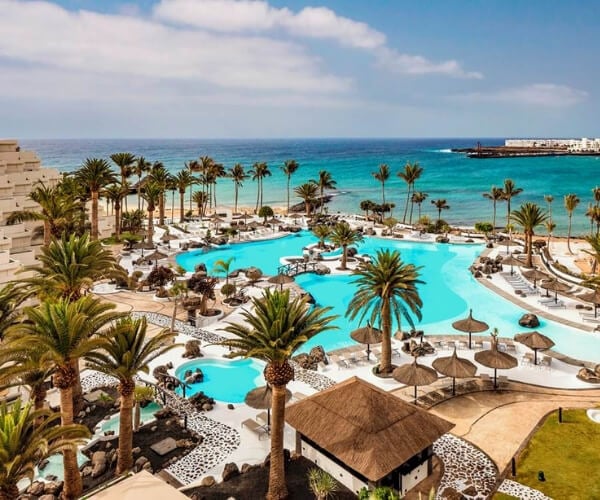 The hotel offers stays on a bed and breakfast, half board, or all inclusive basis. Enjoy the a la carte Italian restaurant for dinner or a buffet breakfast, lunch and dinner in the Mosaico Restaurant.
Amongst the green features offered at this hotel are:
The hotel offers stays on a bed and breakfast, half board, or all inclusive basis. Enjoy the a la carte Italian restaurant for dinner or a buffet breakfast, lunch and dinner in the Mosaico Restaurant.
Amongst the green features offered at this hotel are:
- Tracking of energy use
- Linen re-use programme including housekeeper training and regular checks
- Recycling bins in common areas
- Recycling of at least two types of waste such as paper, glass, plastic and cardboard
- Education for guests and staff training on green practices
- At least 75% of interior lightbulbs are energy-efficient
- Air conditioning and heating temperatures set to save energy
- Energy saving lighting controls in public areas
- South facing overhangs to keep building cool
- Sensors in over 90% of guest rooms turning off lights and controlling temperature when room is empty
- Water efficient guest bathrooms and public restrooms
- At least 90% of toiletries have recycled packaging
- Over 50% of cleaning products are ‘Green’ certified
- Safe disposal of hazardous materials such as batteries and paint
- At least 90% of furniture and mattresses are recycled when replaced
- At least 90% of crockery and cutlery is reusable
- At least 75% of landscaping is plants native to region
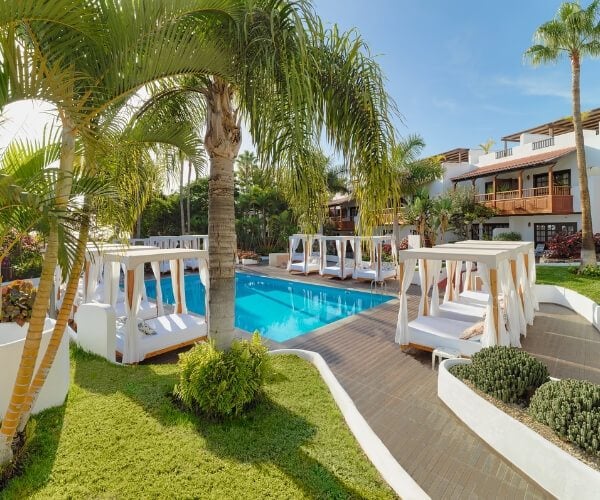 Guests can stay at the hotel on bed and breakfast, half board and full board. Breakfast and dinner can be taken by the sea in the main restaurant. Breakfast can also be taken at the Gara Restaurant with views of the gardens surrounding the hotel, and the sea.
Sporting guests will enjoy the 5 tennis courts, beach volleyball court, squash court, table tennis, fitness centre, mini-golf and a championship 18-hole clifftop golf course.
Amongst the green features offered at this hotel are:
Guests can stay at the hotel on bed and breakfast, half board and full board. Breakfast and dinner can be taken by the sea in the main restaurant. Breakfast can also be taken at the Gara Restaurant with views of the gardens surrounding the hotel, and the sea.
Sporting guests will enjoy the 5 tennis courts, beach volleyball court, squash court, table tennis, fitness centre, mini-golf and a championship 18-hole clifftop golf course.
Amongst the green features offered at this hotel are:
- Tracking of energy use
- Linen reuse programme including housekeeper training and regular checks
- Recycling bins in common areas
- Recycling of at least two types of waste such as paper, glass, plastic and cardboard
- Education for guests and staff training on green practices
- At least 75% of interior lightbulbs are energy-efficient
- Completed energy assessment of the building
- Energy saving lighting controls in public areas
- Sensors in over 90% of guest rooms turning off lights/electronics when room is empty
- Water heated by solar thermal system
- Tree shading to keep building cool
- Water efficient guest bathrooms and public restrooms
- Uses alternative water sources for watering gardens including collecting rainwater and condensation
- Over 50% of fruit and vegetables are certified organic, fair trade, etc.
- Refillable toiletries dispensers and 100% biodegradable toiletries in over 90% of guest rooms
- Yard waste and food waste composted
- Safe disposal of hazardous materials such as batteries and paint
- At least 90% of mattresses recycled when replaced
- At least 90% of crockery and cutlery is reusable
- Low chemical gardening
- Electric car charging station
- Tracks carbon emissions of the building
- EMAS: Eco-Management and Audit Scheme. This enables hotels to assess, manage and continuously improve their environmental performance
- ISO 14001: Sets out the criteria and framework for an environmental management system
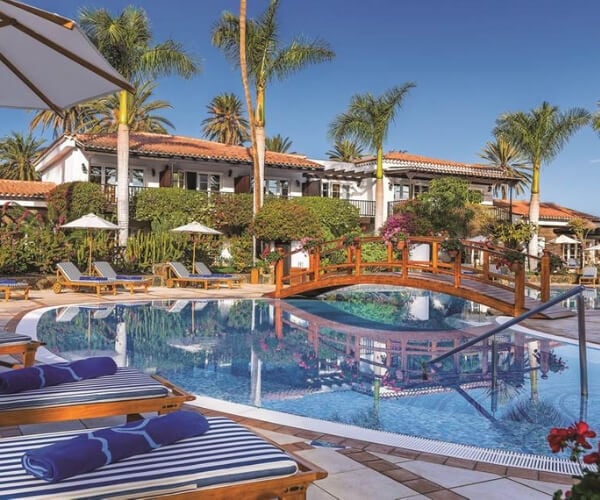 There is 1 main restaurant serving both buffet and a la carte menus where you can take breakfast and evening meal. You can either stay on bed and breakfast or half board at this hotel. During the evening, the hotel provides entertainment which is more regular during the winter season than the summer season.
Amongst the green features offered at this hotel are:
There is 1 main restaurant serving both buffet and a la carte menus where you can take breakfast and evening meal. You can either stay on bed and breakfast or half board at this hotel. During the evening, the hotel provides entertainment which is more regular during the winter season than the summer season.
Amongst the green features offered at this hotel are:
- Tracking of energy use
- Linen reuse programme including housekeeper training and regular checks
- Recycling bins in common areas
- Recycling of at least two types of waste such as paper, glass, plastic and cardboard
- Education for guests and staff training on green practices
- At least 75% of interior lightbulbs are energy-efficient
- Efficient laundry dryers
- Completed energy assessment of building
- Sensors in over 90% of guest rooms turn off lights and adjusts temperature when a guest room is empty
- Air conditioning temperature set to save energy
- Water efficient guest bathrooms and public restrooms
- At least 90% of toiletries have recycled packaging
- Safe disposal of hazardous materials such as batteries and paint
- At least 90% of crockery and cutlery is reusable
- At least 75% of landscaping has plants native to the region and maintained with low chemical gardening
- Low VOC paints, primers, adhesives and sealants used
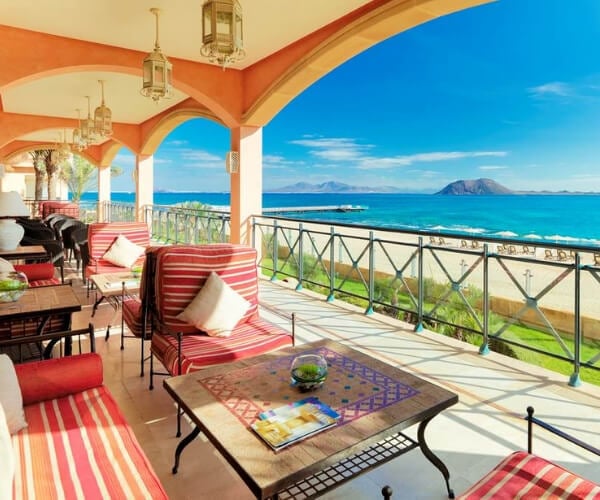 You can enjoy the air-conditioned gym with cardio fitness equipment, an aerobics studio, strength equipment and a whirlpool. Fitness classes are also available including Zumba, pilates, spinning, yoga and aqua aerobics.
Guests can stay at the hotel on bed and breakfast and half board. There are a good number of restaurants to choose from serving from a la carte to buffet menus. You can enjoy Spanish and Japanese cuisine as well as international menus. There’s evening entertainment year round including live music for guests.
Amongst the green features offered at this hotel are:
You can enjoy the air-conditioned gym with cardio fitness equipment, an aerobics studio, strength equipment and a whirlpool. Fitness classes are also available including Zumba, pilates, spinning, yoga and aqua aerobics.
Guests can stay at the hotel on bed and breakfast and half board. There are a good number of restaurants to choose from serving from a la carte to buffet menus. You can enjoy Spanish and Japanese cuisine as well as international menus. There’s evening entertainment year round including live music for guests.
Amongst the green features offered at this hotel are:
- Tracking of energy use
- Linen reuse and towel reuse programme including housekeeper training and regular checks
- Recycling bins in common areas
- Recycling of at least two types of waste such as paper, glass, plastic and cardboard
- Education for guests and staff training on green practices
- At least 75% of interior lightbulbs are energy-efficient
- Efficient laundry dryers
- Completed energy assessment of building
- Efficient heating/air conditioning system
- South facing overhangs keep building cool
- Sensors in over 90% of guest rooms turn lights off / adjusts temperature / turns off electronics when a guest room is empty
- Energy saving lighting controls in public areas
- Water efficient guest bathrooms and public restrooms
- Uses alternative water sources for watering gardens
- At least 90% of toiletries have recycled packaging and toiletries produced with organic ingredients
- Safe disposal of hazardous materials such as batteries and paint
- At least 90% of crockery and cutlery is reusable
- At least 90% of furniture / flooring / mattresses are recycled when replaced
- At least 75% of landscaping has plants native to the region and maintained with low chemical gardening
- Special paving designed to minimise flooding
- Low VOC paints, primers, adhesives and sealants used
- Education for guests on local environment
- Biosphere Certified
Did you enjoy this article?
Receive similar content direct to your inbox.


I love the waterfall bit that makes it look like a lake opening out into a pool at the first one, the Jardines de Nivaria. What a striking photo. I’ve got a soft spot for beachfront hotels even though I don’t spend that long actually on the beach itself, it’s just lovely to look at and you always seem to get a different feel staying close to the sea with a refreshing sea breeze. The lift makes it sound more disability friendly, which I hope is the case.
It’s brilliant you’ve listed the individual aspects of what makes it eco friendly. I’m seeing it more often now with hotels classing themselves as ‘eco’ resorts but then it sounds pretty wishy washy as to what they’ve done or are doing to be sustainable or kind to the environment. Knowing the different elements of what’s involved is quite eye opening. Good on all of these places for going the extra mile and doing everything they can to be truly eco friendly. There are some really beautiful places here, not sure I’d be able to choose between them but they all sound pretty much perfect right now. I’d like a one way ticket I think.
Yes, I particularly like beachhfront hotels so you have a choice of either lazing by the pool or on the beach. The Jardines de Nivaria does have a number of adapted rooms so the hotel is suitable for people with mobility problems.
One way ticket sounds good to me as well!
Sadly, I was staying elsewhere on Corralejo but I’ve been past the Gran Hotel Bahia on Fuerteventura and it has a fantastic location. Good to learn that it is a great eco destination too.
Thanks Pete. Yes, the 5-star Bahia Real is one of the most popular hotels for our clients for luxury accommodation on the island.
A lot of people keep saying “Things will never be the same again” and I think many people will emerge from lockdown appreciating clean air and wanting to take a lot more care of their environment. I can see these hotels doing well post crisis.
I think the COVID-19 crisis has been enlightening in many ways (both good and bad). It will be interesting to see if eco-hotels are requested more once people start to travel again.
These are some very detailed list they have here, and many are the same for the hotels. Some practices I’ve never heard of although I’ve stayed in a hotel that offered organic products and also had some had their own gardens. In some resorts they ask guests to use towels for 2 days and to use a glass when brushing their teeth to save on water. But that’s not to take away the luxurious quality of these hotels. With just the look of it, you can easily say that it would be great to spend a day or two there. You can also see that it is surrounded by trees and other greens, by that you’d already know that it’s environment-friendly and that the hotel appreciates nature. Well, I’m a sucker for blue seas and clean airs so I would definitely visit these hotels, assuming that the lockdown ends soon of course.
Thank you for presenting these eco-friendly hotels. Would be good to have in the future sailing ferries to get to the Canaries and avoid the plane’s carbon.
Thank you Charlotte. I can see your point regarding travellers’ carbon footprint. There are certain airlines that try to offset this by environmental initiatives. It is possible (albeit very time consuming) to get down to Tenerife by other means. I’m not sure where you are located, but a possible route would be a train from London to Paris, then another train from Paris down to Cadiz in southern Spain. From there a boat down to Tenerife. It does take around 60 hours each way as opposed to a 4.5 hour flight. Not sure I could cope with 60 hours travelling.